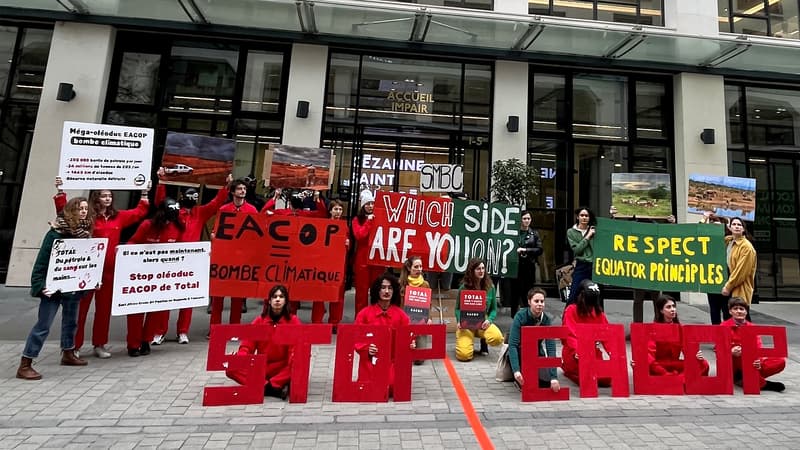Totalenergies’ strategy has drawn much criticism from environmental associations and NGOs, which made themselves heard on Friday by trying to block access to the group’s general assembly in Paris. They point in particular to the controversial $10 billion EACOP heated pipeline project in East Africa, which has become a media symbol of the world’s anti-oil fight.
What are we talking about?
Eacop is an acronym for “East African Crude Oil Pipeline”, a giant pipeline project that runs through Uganda and Tanzania for almost 1500 km to transport crude oil drilled in Uganda to the edge of the Indian Ocean at the port of Tanga.
Its commissioning is scheduled for 2025 and would then be the longest heated pipeline in the world.
Why is this project so controversial?
in a tribune of Worlda group of 188 scientists and experts denounced the “carbon bomb” that this project represents.
While the International Energy Agency (IEA) and the IPCC emphasize that no new oil and gas projects should be launched if we are to meet the target of 1.5 degrees of warming compared to pre-industrial times, this project appears to contradict this goal. of the Paris Agreements.
The project aims to extract 200,000 barrels of oil per day. According to the NGOs cited by Reporterre, “taking into account the indirect greenhouse gas emissions from the use of the oil produced, we arrive at 34.3 million tons of CO2 per year. That is more than the combined emissions of Uganda and Tanzania”.
Beyond this “carbon bomb”, the pipeline would go through 16 protected natural areas where many wild animals (lions, antelopes, monkeys) live. The environmental defense associations thus evoke a risk of “ecocide” over an area of 2000 km2, according to a report.
According to Martin Kopp, responsible for the mobilization in Greenfaith quoted by AFP, the pipeline “which would represent twice the length of the Seine” is “an aberration from an ethical point of view, because Total is attacking climate justice, human rights” . that are already violated the diversity of life”. Above all, it will cross 35 rivers, as well as the Lake Victoria basin, the second largest freshwater lake in the world.
Finally, the project requires the displacement of populations: 723 families will have to leave their homes and 18,000 people will be affected in total.
How does Totalenergies defend itself?
Regarding the very existence of the project, Patrick Pouyanné, CEO of the French giant, challenges in an interview with The cross critics, explaining that his group is responding to growing demand from developing countries.
The oil company also claims to have developed a project among the least CO2 emitters in its history: 13 kg of CO2 per barrel, a highly underestimated figure according to the associations.
Regarding the fauna and flora, TotalEnergies affirms that the “oil pipeline does not cross any protected area or any Ramsar zone (recognized wetlands of international importance, editor’s note)”. The industrialist even affirms that his project has a positive impact on biodiversity since it promises to return the site to a better state than before the works.
TotalEnergies also promises to finance the reintegration of wild animals in Uganda, such as the black rhino. The preservation of rivers and lakes is also a priority according to the firm.
However, a leak near these areas could cause an oil spill while 40 million inhabitants depend directly or indirectly on these streams and lakes.
Totalenergies finally promises to financially compensate the displaced inhabitants, or even offer them a new home. In the act, the interested parties criticize that the compensations are very insufficient.
The government does not interfere
Asked on Friday in Franceinfo about the controversial Eacop heated pipe project, the Minister of Energy Transition, Agnès Pannier-Runacher, asked to “avoid giving lessons”, in particular in relation to Uganda, stressing that the African countries with which it meets, in particular in the context of climate conferences, they express the “need for means of development” and refer European countries to their record in terms of emissions, “worse” than theirs.
Source: BFM TV


